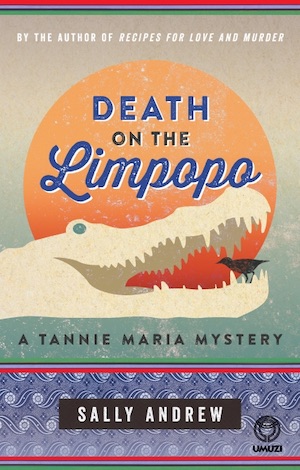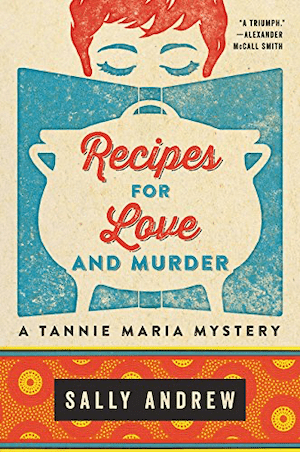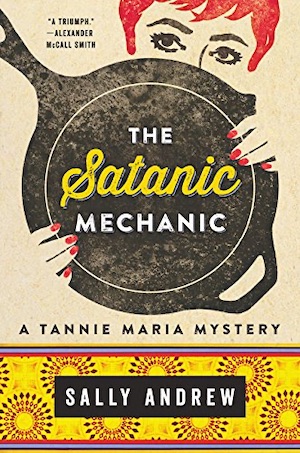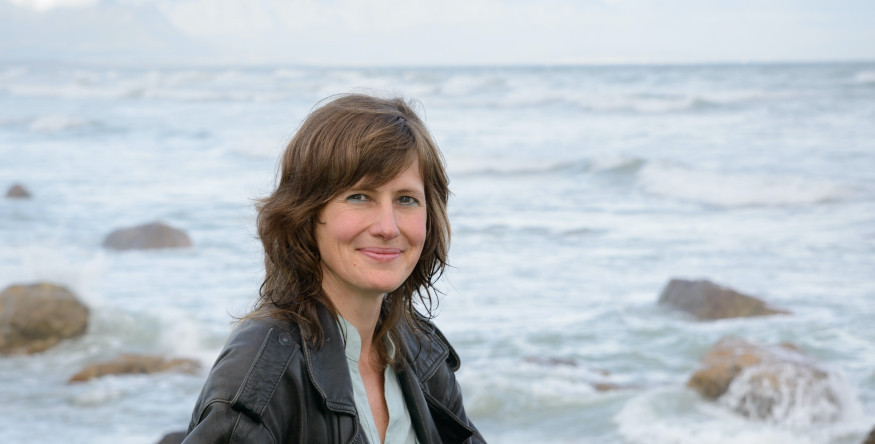At the foot of South Africa’s Swartberg Mountains lies Ladismith. This remote little Klein Karoo town is the home of South African crime writer Sally Andrew as well as her inimitable main character, Tannie Maria van Harten. Tannie is Africa’s most famous crime-busting agony aunt, and Death on the Limpopo, which features her latest exploits, came out last month in South Africa and should be available soon in the US and UK. We decided to talk to the author about her career, as she breaks onto the international scene.
Before Sally committed herself to writing full-time she was a social and environmental activist, a background which shines through in the subject matter of her books. In 2015 her first Tannie Maria book, Recipes for Love and Murder, came out and established the amateur sleuth. Death on the Limpopo is third in the series.
Your books probably fall into the cosy category and make a clear shift away from grit and violence. Is this a conscious decision?
Yes, very much so. I don’t enjoy or respect gratuitous violence. Being murder mysteries, there is of course some violence, but my emphasis is always on finding justice and healing. The characters and setting provide delight, beauty, humour and personal journeys – I reckon these elements play a role in any healing process.

South Africans are made aware of violence on a daily basis. Do you think this changes the way South African crime writers write?
It affects us all differently. Usually countries with a violent history like Brazil don’t enjoy murder fiction; and peaceful ones like Sweden love their noir crime. But in South Africa we have a diverse and talented bunch of writers with a full array of approaches. I think that my own exposure to violence leads me to want to escape or heal from it, rather than roll around in it.
You used to do social work in communities, dealing with some of the issues you also address in your books. Does this make it easier to write about?
Yes, it does. I am no longer an activist in the organisational sense. But my experiences and passions are easily available for me to weave into the story. One has to be careful, however, not to be preachy. I don’t think it works to tell people what to do or think.
Your two main characters, Maria van Harten and Zabanguni Kani, are both strong women. Are they inspired by someone in particular?
No. Although I’ve encountered a lot of strong women in my political and personal life. Maria helps me to laugh, cook, be kind, open-hearted and stay grounded. Zaba rides a black Ducati bike and likes her coffee strong, black, no sugar. Her middle name is Nozizwe, which is my Xhosa name, and she does contain elements of my activist self from the 1980s. Her clan name, Duma, belongs to my friend Nono Silimela, who’s had some influence too. Zaba works for the Daily Maverick, and her character is a way for me to pay homage to our brilliant investigative journalists who’ve been at the forefront of busting corruption in South Africa.

Recipes for Love and Murder was born from a close encounter with a leopard. Were there any animal encounters this time around?
A whole riverine forest full of animal encounters! Where the Limpopo River meets the Shashe River in Botswana is one of my favourite places, and it is full of wild things – including my man, wilderness artist, Bowen Boshier, who introduced me to this area, which he has known since childhood.
In Death on the Limpopo, Maria and Zabanguni do a road trip I have done myself, from Maria’s home in Ladismith, across the Klein and Groot Karoo via the Cango Caves, Prince Albert and Graaff-Reinett to the great grey-green greasy Limpopo River where the crocodile has its dinner. Spot the childhood Kipling inspiration here too…
South African authors who want to be published internationally might shy away from using Afrikaans words, but you don’t. Do you think this might limit your reach?
It is a risk I have taken. And in the third Tannie Maria book I have a lot of Xhosa words too. I find it irritating when I read an English book and the author throws in a lot of foreign words that I can’t understand. But I am always careful to immediately translate or make the meaning clear. For most international versions I also have a glossary. The Tannie Maria books are published in 14 languages so far, so they seem to be handling the culture-infusion internationally.

Your books are very visual and will translate beautifully to the screen. Any chance of seeing these characters come to life in a series or movie?
Definitely. Both Worlds producers have secured the option for film rights. We’re hoping production will begin next year on an international TV series. Details will follow when the deals are wrapped up.
It’s not often you’ll find a crime fiction novel with its own section of recipes. Have you had any feedback from readers and which is your favourite?
Yes. Many readers love the recipes and take them very seriously. Book clubs hold Tannie Maria banquets. I’ve spent a disproportionate amount of time, energy and engagement of professional chefs and amateur tasters to find, develop and test the recipes to ensure they are all moan-out-loud delicious.
I have a soft spot for the Venus Cake from book two: Tannie Maria and the Satanic Mechanic. Perhaps because it was invented from scratch, took around 10 trials to perfect and the flavours (coffee, choc, peanut butter and apricot jam) are so in character with Tannie Maria and so spectacularly divine. The Milk Tart from book one, Recipes for Love and Murder, and the Weerligkoek with pink grapefruit curd and Bella’s Divine Loaf from book three are also sublime. Then there’s that bobotie, and the mutton curry… Oh, it’s way too hard to choose a favourite.
Will there be more in the series or should we not grow too attached to Maria?
Grow attached. Fall in love. Maria van Harten (nee Bell) is going to stick around for as long as there is koffie and beskuit. And people who’ll welcome her onto their stoeps. But please be patient between visits, as I need time to write and rewrite so the story, themes, language and recipes are all just right.
Watch for our review of Death on the Limpopo soon. Image by Andrea Nixon. Click here to read about more South African crime authors.
Death on the Limpopo can be purchased via the Penguin Books South Africa website.
